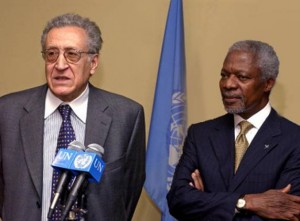 The Syrian government has consented to the idea of Algerian diplomat Lakhdar Brahimi replacing Kofi Annan as the U.N.-Arab League mediator in the Syria conflict, though Brahimi has yet to accept or reject the post, Annan’s spokesman said on Tuesday.
The Syrian government has consented to the idea of Algerian diplomat Lakhdar Brahimi replacing Kofi Annan as the U.N.-Arab League mediator in the Syria conflict, though Brahimi has yet to accept or reject the post, Annan’s spokesman said on Tuesday.
Annan, a former U.N. secretary-general and Nobel Peace Prize laureate, announced he would step down on Aug. 31 because he was not able to carry out his job with the U.N. Security Council’s veto powers hopelessly divided and deadlocked.
Annan’s spokesman Ahmad Fawzi told Reuters that the Syrian government would accept Brahimi as Annan’s replacement, though the veteran Algerian diplomat “hasn’t said yes or no.”
Fawzi’s comments appeared to confirm what diplomats told Reuters last week — that Brahimi was tipped to replace Annan.
Council diplomats told Reuters that Brahimi expressed reservations about the job, telling U.N. Secretary-General Ban Ki-moon and Arab League chief Nabil Elaraby that he was concerned about the deadlock on the Security Council and wanted “strong support” from the 15-nation body.
Brahimi issued a public statement last week saying the council and regional states “must unite to ensure that a political transition can take place as soon as possible.”
Russia, with the aid of China, has vetoed three resolutions criticizing and threatening sanctions against Syrian President Bashar al-Assad’s government for its 17-month attempt to crush an increasingly militant opposition with military force, heavy weapons and aerial assaults.
The United States, which has stepped up non-lethal support to the rebels, saw little point in replacing Annan, given Russia’s staunch opposition to sanctions, diplomats said. Qatar and Saudi Arabia are arming the rebels, diplomats say, and voiced little support for Annan’s peace efforts.
MORIBUND PEACE PLAN
U.N. officials said Ban hoped to make an announcement about Annan’s successor in the coming days, whether or not it would be Brahimi who takes over.
Brahimi, 78, has served as a U.N. special envoy in a series of challenging circumstances, including in Iraq after the U.S. invasion that toppled Saddam Hussein; in Afghanistan both before and after the end of Taliban rule; and in South Africa as it emerged from the apartheid era.
Other candidates, diplomats said, include former European Union foreign policy chief Javier Solana of Spain, former Spanish Foreign Minister Miguel Angel Moratinos, former U.N. special envoy to Libya and Jordanian Foreign Minister Abdelilah al-Khatib and Italian-Swedish diplomat Staffan de Mistura.
Whoever replaces Annan will inherit his moribund six-point peace plan, which both the rebels and government had initially embraced but is now in tatters, with the violence escalating dramatically in recent weeks as the government steps up its onslaught to wipe out rebel territorial gains.
The U.N. Security Council is expected to allow the mandate of a U.N. observer mission in Syria to expire on Sunday because violence there has not receded enough to allow it to function. Russia has called for the monitors to remain in Syria but the United States has made its opposition clear.
The Security Council said last month it would only renew the mandate of the mission, which was deployed in April to monitor a truce that never took hold, if the world body confirmed a “cessation of the use of heavy weapons and a reduction in the level of violence by all sides sufficient” for it to operate.
In an Aug. 10 letter to the Security Council Ban said this has “not been achieved” and the mission, known as UNSMIS, “has not been able to exercise its key functions of monitoring the cessation of violence.” The mandate expires Aug. 19.
The mission’s initial 300 unarmed observers, whose role has been to monitor a failed April 12 ceasefire, suspended their activity on June 16 because of increased risk from rising violence. There are also over 70 civilian staff working on a political solution and monitoring human rights violations.
The Security Council is due to be briefed on Syria on Thursday and diplomats said that if UNSMIS is allowed to expire, Ban would not need a new resolution from the deadlocked Security Council in order to maintain a political and humanitarian presence in the country.
“The United Nations humanitarian agencies will remain active, even if the mandate of UNSMIS expires,” Ban said, adding that it was vital for world body to maintain some kind of presence in Syria beyond the aid work.
Reuters

Leave a Reply
You must be logged in to post a comment.